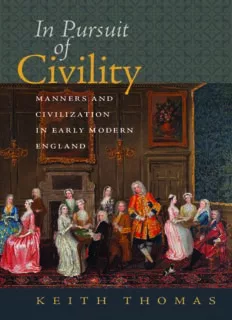
In Pursuit of Civility: Manners and Civilization in Early Modern England PDF
Preview In Pursuit of Civility: Manners and Civilization in Early Modern England
In Pursuit of Civility Manners and Civilization in early Modern england K e i t h th o m a s in pursuit of Civility 12 the menahem stern jerusalem leCtures Brandeis University Press Historical Society of Israel 1 Keith thomas 2 In Pursuit of Civility ․․․․․․․ manners and Civilization in early modern england ․․․․․․․ Brandeis University Press Waltham, Massachusetts 12 historical society of israel / brandeis university press An imprint of University Press of New England www.upne.com © 2018 Keith Thomas All rights reserved For permission to reproduce any of the material in this book, contact Permissions, University Press of New England, One Court Street, Suite 250, Lebanon NH 03766; or visit www.upne.com The excerpt from Richard Wilbur’s translation of Molière’s The Misanthrope is reprinted by permission of Houghton Mifflin Harcourt Publishing. F. R. Scott’s poem “Degeneration” is reprinted by permission of William Toye, literary executor for the estate of F. R. Scott. Library of Congress Cataloging- in- Publication Data available upon request Hardcover isbn: 978-1-5126-0280-7 Paperback isbn: 978-1-5126-0281-4 Ebook isbn: 978-1-5126-0282-1 1 to 2 john, riChard, and madeline Contents ․․․․․․․ Foreword by David Katz ix Preface xiii Introduction 1 1 1 2 Civil behavior 11 The Chronology of Manners 11 Manners and Gentility 23 Refinement 37 1 2 2 manners and the soCial order 49 The Social Hierarchy 49 The Topography of Manners 57 The Civility of the Middling Sort 62 The Manners of the People 65 Civilizing Agents 70 Plebeian Civility 74 1 3 2 the Civilized Condition 86 Civil Society 86 Civilized Warfare 104 A Civilized Compassion 110 Civilized Manners 121 The Fruits of Civility 127 1 4 2 the progress of Civilization 134 The Ascent to Civility 134 Barbarous Neighbours 153 1 5 2 exporting Civility 159 Confronting the Barbarians 159 Civilizing by Force 163 Inventing Race 173 Fighting and Enslaving 176 1 6 2 Civilization reConsidered 183 Cultural Relativism 183 Another Kind of Civility 188 The Civilizing Mission Disputed 198 The Defects of Civilization 206 Civilization Rejected 210 1 7 2 Changing modes of Civility 219 Xenophobic Masculinity 219 Manners and Morality 223 The Quaker Challenge 230 Democratic Civility 235 The Future of Manners 247 Note on References 257 Abbreviations 259 Notes 261 Index 349 foreword David S. Katz ․․․․․․․ The great Swiss historian Jacob Burckhardt prefaced his study of the civi- lization of the Renaissance in Italy by remarking that to “each eye, perhaps, the outlines of a given civilization present a different picture.” The historical sources are a “wide ocean,” and in fact “the same studies which have served for this work might easily, in other hands, not only receive a wholly different treatment and application, but lead also to essentially different conclusions.” Burckhardt wrote these words, derived from his personal experience at the coal face of historical research in the mid- nineteenth century, at a time when the field was becoming professionalized in the Age of Ranke. Historiograph- ical theory eventually caught up with what Burckhardt already knew. In the 1930s we were informed that it is the job of historians to recognize patterns in the stream of past events. Fifty years later it was revealed that there is no his- tory “out there” waiting to be transferred to the printed page. It is the historian who chooses the subject and paints a coherent picture from the material he or she selects. This is why Burckhardt wrote that his bulky book was merely “an essay in the strictest sense of the word.” For over half a century, Keith Thomas has sailed that “wide ocean” of early modern English historical sources, alighting on scholarly islands of his own creation: religion and the decline of magic, man and the natural world, the ends of life, and now the concept of civility, not to mention smaller but im- portant islets along the way. His working technique is no secret, observable not only to regular denizens of the Upper Reading Room of the Bodleian Library at Oxford, but also to readers of the London Review of Books, where in a fascinating article published in 2010 he revealed how he does it (“Diary,” London Review of Books, 10 June, 2010). Keith Thomas developed a unique system, which begins with note taking, then cutting up the gobbets into strips that are crammed into envelopes bearing subject titles and are finally stapled onto pieces of paper that are stacked in a particular order, and this all before he begins to write. The technology is old- school, and as Thomas himself com- ments sardonically, most of what takes him days to do can now be done by searching a database for a key word. But all that depends on knowing upon which wide ocean to sail. As Ranke
Description: